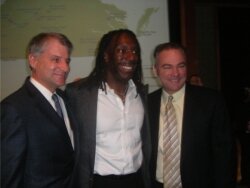Biscuit Run bonanza: How Hunter Craig turned a donation into a windfall
-
 Craig and fellow UVA BOV member Alan A. Diamonstein at a Richmond retreat in August 2012.File photo by Hawes Spencer
Craig and fellow UVA BOV member Alan A. Diamonstein at a Richmond retreat in August 2012.File photo by Hawes Spencer -
 Life in the Biscuit Run "donut hole": The Breeden family home sits on 36 acres at the center of what will someday be a state park. Peyton Walz, left, Summer Puopolo, center, and Elizabeth Breeden are brainstorming ideas for how best to use the land that's been in their family for 40 years, but they do know they want to be "good neighbors" to the park. "We don't think 100 houses is the best use for the land," says Walz.Courteney Stuart
Life in the Biscuit Run "donut hole": The Breeden family home sits on 36 acres at the center of what will someday be a state park. Peyton Walz, left, Summer Puopolo, center, and Elizabeth Breeden are brainstorming ideas for how best to use the land that's been in their family for 40 years, but they do know they want to be "good neighbors" to the park. "We don't think 100 houses is the best use for the land," says Walz.Courteney Stuart -
 Outgoing Governor Tim Kaine, right, joined developer Hunter Craig, left, and DMB violinist Boyd Tinsley to celebrate the December 2009 donation of the parkland at a December 2009 event at the Monticello Visitors Center.file photo by courteney stuart
Outgoing Governor Tim Kaine, right, joined developer Hunter Craig, left, and DMB violinist Boyd Tinsley to celebrate the December 2009 donation of the parkland at a December 2009 event at the Monticello Visitors Center.file photo by courteney stuart -
 Life in the so-called "donut hole" is idyllic, with mountain views and rolling fields. The planned state park guarantees the land around the Breeden's property will always retain its rural character.Courteney Stuart
Life in the so-called "donut hole" is idyllic, with mountain views and rolling fields. The planned state park guarantees the land around the Breeden's property will always retain its rural character.Courteney Stuart -
 Craig admired the Biscuit run parcel as far back as the early 1980s, when he was in college.uva
Craig admired the Biscuit run parcel as far back as the early 1980s, when he was in college.uva
Hunter Craig has a way of snatching victory from defeat. Craig's masterstrokes in the field and in the courtroom follow a tumultuous year for the now 52-year-old media-shy banker, developer, and UVA Board of Visitors member. In May 2012, he withstood a publicized effort to remove him from the bank he helped launch. Two months earlier, one of his children was diagnosed with cancer. While arranging for the girl's treatment, Craig suddenly found himself near the center of what became known as "UVA June."
As the lone Charlottesville-based executive committee member of the University of Virginia's governing body, Craig initially signed off on the resignation of President Teresa Sullivan last summer– and found himself vilified. But as turmoil mounted over the ouster of the popular president, Craig publicly offered to resign to make way for a faculty member on the Board, and he expressed frustration that he wasn't able to muster the votes to bring back the president. A few days later, over the objections of Rector Helen Dragas, Craig and two others forced a Board meeting to take another vote. Although Dragas quickly issued her right-move-the-wrong-way memorandum and secretly plotted to push student leaders to parrot sentiments provided by paid spin-doctors, support for the ouster crumbled. Sullivan was reinstated.
And then, of course, there's Biscuit Run, the 1,200-acre southern Albemarle County tract that Craig and a group of investors donated to the state in late 2009 after their bubble-era bet went bad.
After a three-day trial in Albemarle Circuit Court ended with an April 17 ruling that the land was worth $86.5 million, it appeared the Teflon developer had once again escaped unscathed.
"Good job," Craig silently mouthed to his legal team as the trial judge gave him 99 percent of what he was seeking, a decision that appears to uncork tens of millions in tax rewards that may rescue Craig and his fellow real estate speculators from a loss that could have soared into eight figures.
Critics claimed that Craig's litigation– which sought to peg the value of the land as high as $87.7 million, nearly double its price just four years earlier– was pushing taxpayers to bail out misguided millionaires who had stopped paying their mortgage. After the ruling, Craig conceded that the cascade of cash unleashed by his win in Forest Lodge LLC v. Commonwealth of Virginia may net him a profit, but he says he and his investors would have reaped far richer rewards simply by holding on and waiting out the downturn.
"I wish we had the property today," said Craig amid some celebratory back-slapping upstairs in the Albemarle County Courthouse. "I think it would be worth over $200 million today."
If it sounds like bravado, there are recent signs that the Charlottesville housing market is on the mend. More crucially to the case, Craig and his lawyers mustered a trove of evidence to recast the narrative far from some portrayals of Biscuit Run as a money pit. While long the province of a fun-loving, art-creating family named Breeden, the near-town tract may have been more like a pot of gold, one that Craig would lift to the surface with a two-year rezoning process.
"You go through a rezoning to create value," testified Craig, telling the court that his team gained $70 million in value on the night in late 2007 when Albemarle supervisors unanimously rezoned the rural property. That move allowed him to triple the residential density– to build 3,000 units instead of 1,000 and add a commercial center. As evidence of the alleged spike in value, the court took evidence of three purchase offers, each valuing Biscuit Run around nine-figure sums.
The high-rolling developer told the court that his investors had a combined net worth of over a billion dollars. So why would such a deep-pocketed team stop making their loan payments? That, Craig told the court, was a deliberate "scorched earth approach" to bring the bank to the negotiating table– a move, he added, that resulted in a "substantial discount."
As for the decision to sell the land to the state for less than a quarter of what they'd paid, well that was what some of his investors sought as a "legacy" gift to the people as parkland. And as the trial ended, Craig's team of investors seemed to prove they really had parted with their parcel for far less than its true value.
"It's the nicest property I know of," testified Craig. "It's a Boardwalk property, not Park Place," referring to the first and second most valuable spots on a Monopoly game board.
No stranger to the game of real estate, Craig was raised in a family of builders, and he created such neighborhoods as Mill Creek, Western Ridge, and Kenridge. His track record includes obtaining the parcels that would become the site of the Whole Foods supermarket, as well as the mammoth Stonefield mixed-use complex.
As for Biscuit Run, Craig told Judge Paul Peatross that he began coveting the 1,194-acre tract even before graduating from college back in 1984. As he and others would testify, Biscuit Run grabs outsized value from its location in a sought-after college community whose households enjoy above-average income, education levels, and quality of life. Moreover, by lying inside the county's growth area, the tract comes pre-approved for connection to utilities and would have charmed home-buyers with meandering streams and rolling hills.
"Virtually every pod in the property," said Craig, "would allow for a vista."
In late 2005, Craig found confirmation of the tract's desirability in the form of 15 other development teams vying for the privilege of bidding and developing. After the first round, only four teams were allowed to submit a final bid for the prize.
"They knew they had a hot ticket," said Jim Neale, one of Craig's two lawyers.
Four-and-a-half years later, at a star-studded announcement, an outgoing governor rejoiced that Craig's team was providing the land for Virginia's newest state park at what Tim Kaine then called the "bargain" price of $9.8 million.
Some state officials, however, would recoil a few months later when Craig came calling for tax credits. According to the Virginia Department of Taxation, the specific defendant in the suit, the property was worth just $39 million. To Judge Peatross, however, the state erred by letting a tax department lawyer, one who had been participating in meetings demanding a lower value, conduct the first of the state's two appraisals.
"How is that fair?" asked Peatross. "How can he do an independent appraisal?"
The department obtained another appraiser, but as the plaintiff pointed out, the second man– based in Roanok– had never before conducted an appraisal in Albemarle, and he neglected to perform a cash-flow analysis. More ominously for the state's case, its appraisers conceded that the fall in the value of land during the fall from the peak was no more than 30 percent. The plaintiff asserted that those percentages– if applied to the bubble-era purchase offers– would result in valuations at or above their request. And the purchase offers were stellar.
The highest came in early 2006 from Pulte Homes, a national firm which offered to pay $152 million minus approximately $20 million that Albemarle County required in cash proffers. Craig said he turned Pulte down.
"At that time I thought I could get a better offer," a rueful Craig testified. "The market was stronger than horseradish."
The two subsequent offers were lower. Still, they were far above the purchase price and far above the proffers: about $101 million for one and a quarter of the ongoing profits atop $93 million for the other.
"They are certainly indications of value by willing buyers," said Neale.
The tax department's lawyer, Senior Assistant Attorney General John Patrick Griffin, pointed out the obvious fact that none of the offers actually transacted, and he suggested that Craig's appraisers simply "fit" a number to match a desired value. He said it was "interesting" that the two appraisals for Craig– at $86.5 and $87.7– found such similar values. Neale fired back that the notion was "insulting" and unsupported by any evidence.
Nonetheless, Griffin suggested that the ensuing real estate collapse gave Craig and company a powerful incentive to inflate the value of their donation. After all, every dollar would result in 40 cents of state tax credits– not to mention state and federal income tax deductions.
Actually, such deductions should be mentioned because they may now become part of the cost of this "gift." With Virginia's top tax rate in 2009 at 5.75 percent and the federal rate maxing out at 35 percent, that's a combined 40.75 percent benefit.
In other words, while the court's decision will unleash nearly $31 million in state tax credits, any state and federal income tax deductions may loom larger– as much as $31.3 million more. When one starts doing the math, Biscuit Run will probably be the most expensive park in Virginia history: a land cost that could top $72 million, or over $60,000 per acre. (By contrast, of two recent parkland transactions of similar size, Middle Peninsula in Gloucester County carried an acquisition cost of $6.1 million and the other, Seven Bends in Shenandoah County, was mostly donated, according to state parks spokesperson Gary Waugh.)
Compounding the irony for Albemarle County–which already possesses its own 3,300-acre park system and has the Shenandoah National Park as its western border– is that Biscuit Run State Park won't give Albemarle what its planners really want: athletic fields. Further compounding the irony is that development of Biscuit Run required Craig to deed the county over 400 acres of terrain as parkland. But this trial wasn't about what's best for the state. It's about the evidence, and some of the state's evidence came under blistering attack.
For instance, one of the "comparable" land transactions was a tract in Bedford, and another in Boutetourt. Neale said he meant no disrespect to those communities, but he said they couldn't compare to the "singular" status of Biscuit Run in the shadow of Monticello, the historic home of Thomas Jefferson.
Another of the state's so-called "comps" was Wilton on the James in Eastern Henrico, a community adjoining a sewage-treatment plant and allegedly needing over $23 million in road and utility connections before launching development. Another was Charter Colony in Chesterfield, a neighborhood bisected by a four-lane divided highway and a high-voltage overhead power line.
But the most damming part of the evidence may have been the admissions by both the state-hired appraisers that they assigned no value to the three written offers Craig received.
"Market conditions were so dramatically different," said lawyer/appraiser Larry Salzman, "that they were apples and oranges."
However, the bible of the industry, USPAP– the Uniform Standards of Professional Appraisal Practice– demands that offers receive at least some consideration.
Yet another blow to the state's case came from attacking Craig-hired appraiser Ivo Romenesko for having previously pegged the property's value at just $51.3 million. As Neale pointed out, however, that appraisal (conducted on behalf of a lender) occurred prior to the rezoning. Moreover, Neale kept hammering, all the purchase offers were contingent on rezoning.
"The rezoning was everything," intoned Neale. "That's what transformed it from a nice Virginia development to a project of national scope."
Judge Peatross began hinting that he agreed on the second day of trial when Griffin expressed outrage that a property could double in value during the "worst recession since 1929."
"Did it have anything to do with going from 1,000 to 3,000 units?" asked the judge.
Judge Peatross would surprise the cluster of business-suited attendees the following day after closing arguments by taking just a five-minute break before choosing Romenesko's post-zoning appraisal of $86.5 million as the "most credible."
The other appraisal, by Patricia O'Grady Filer of Orange, he said, which placed the value at $87.7 million, was impacted by her decisions to presume a potentially optimistic 300 sales per year for 10 years and to project $10 million in development costs in the final year of the project (a questionable assumption which could skew the cash-flow analysis in Craig's favor). In Filer's favor, her analysis assumed no sales at all for the first 18 months, as that was when the developer would be laying utilities and constructing roads, and– a decision that history seems to be validating– avoiding bringing parcels to market during the worst depths of the housing crisis.
Although Filer testified that she took the $25,000 assignment on an admittedly rushed basis, her report largely won favor with Jack Boykin, a longtime Virginia Commonwealth University professor who qualified as an expert witness because his textbook and journal articles have become industry standards. He testified that he reviewed Filer's work before its submission to the state for tax credits.
At trial, the assistant commissioner at the Virginia Department of Taxation, Larry Durbin, testified that about five percent of conservation credit applications get special review, about three percent get audited, and about one percent get adjusted. Craig's litigation marked only the second time that an aggrieved credit-seeker sued the state, Durbin said.
"It might be the first time a court has ruled on value," said co-counsel for the plaintiff, Craig Bell, "so this is huge."
The case drew wide advance publicity in Charlottesville as an alleged example of socializing risk and bailing out speculators.
"Pat [O'Grady] Filer in particular was vilified," said Bell. "This pretty much body-slams the people making the comments."
Not everyone feels body-slammed.
"This is nothing but socialism for the rich," says retired Albemarle County teacher Mark Crockett. "They profess a love for the market, but then they want the government to bail them out. I hope the state appeals it."
Brian Gottstein, spokesperson for the Attorney General said afterwards by email that no decision would be made on a potential appeal until the AG's office resolves a lingering counterclaim against Craig's company over a disputed tax bill, and Charlottesville-based legal analyst David Heilberg, doubts the case would be reversed on appeal.
Conservation tax credits have become a sizable reward system in Virginia. Launched in 2000 with legislation drafted by Bath-based state legislator Creigh Deeds, the program was designed to save family farms and forests, but has also drawn criticism as a tool for wealthy people to pull cash out of their land. The program has grown to give as much as $114 million annually, and critics of the haul now include Deeds.
"This has gotten out of hand," Deeds says in the wake of the verdict. "I'm concerned that it's gotten out of control."
In 2012, Deeds drafted legislation that wouldn't have shrunk the program but would have begun revealing which properties were getting the credits. It didn't pass.
"The cottage industry that's been created by the credit system," Deeds says, "came out in force to defeat it."
In addition to "bail-out" accusations, the Biscuit Run deal has drawn fire for taking two years of local government's time on a master plan that would never happen. More crucially in a county that attempts to corral development around roads, schools, and utilities, the deal removed the single largest tract from the "growth area," a move widely seen as encouraging sprawl.
Three years later, the Albemarle County Supervisor who uttered the loudest initial criticisms finds his dismay deepening over what he sees as a misuse of the conservation tax credits.
"This program should never be used to purchase rezoned property in a community's growth area," says Supervisor Dennis Rooker. "It should be preserving property in rural areas."
Biscuit Run as a neighborhood would have given the County 403 acres of parkland. Now, citizens stand to receive nearly 800 additional acres, but the state parks spokesperson confirms that no money has been budgeted to operate or even to develop such a park.
"Does it really make sense to pay that kind of price for parkland," asks Rooker, "and leave yourself without enough money to open the park?"
Ironically, when the park does finally open, nature-lovers could find themselves staring at 100 units of houses and/or apartments in the center. That's because some of the longtime landowners– Elizabeth Breeden and her seven children and stepchildren– retain 36 acres in what has become known as the "donut hole."
The General Assembly approved a special law in 2011 to allow a land swap. However, Breeden says, the family was unable to reach an agreement with the state.
"We just decided we like our hole land, thank you," says Breeden, whose children and stepchildren are the owners of the property and will make final decisions on its use. None of the family loves the idea of building tract homes in the middle of the state park, and they're considering all their options including providing commercial support for the park in the form of stores or other amenities.
"We'll hold on to it and pay taxes on it until somebody pops up with a brilliant idea," says Breeden.
At this point, about the only person credited with any brilliant ideas is Hunter Craig. The trial showed that he had national developers clamoring to pay over $100 million for the tract he'd long eyed, and even when the economy soured he found a lifeline in the state's own largesse, a move that even deal-lamenting Rooker asserts that Craig would have been unwise to ignore.
"Based on what I've read, the developers were well-represented in this case," says Rooker. "This is an example of a poorly designed program. I don't blame the developers."
14 comments
This entire fiasco was caused by a backroom deal with Tim Kaine and a corrupt process from start to finish. The offers were as irrelevant as Lindsay Lohans asking price for a movie before and after she crashed.
The only value that the state should have used is what that land would have sold for outright on the day the title transferred to the state. It would have not been anywhere near these values. Why didn't they ask the people who valued it for Pulte to come back and make another reassessment and offer and let the state decide whether they want to match or beat it? The state rules need to be changed to make sure that property values are determined before the sale and are unappealable. If developers don't like it then let them surrender it to the bank.
If they were truly going to do a forensic appraisal then they also needed to include the desperation of the seller which is paramount in any transaction.
I have no problems with people making money. I do have problems with people using their political connections to get bailed out at taxpayer expense and sticking the county of Albemarle with a useless park that is costing the taxpayers 800 dollars a day in lost tax revenue. It will never generate enough tourism or even use to justify that. This was simply Tim Kaine wasting taxpayer money in the name of land preservation. He didn't "preserve" anything . All that he accomplished was creating a shortage of available land close to town which will force the taxpayers to bear even further costs supplying infrastucture as development is scattered elsewhere requiring more roads electric wires and longer school bus routes. The County Board of supervisors sat on thier hands and let this happen without so much as a whimper. (I wonder why?)
If the state had not stepped in and rescued this it would have sold on the courthouse steps and someone would have bought it. The investors would not have been bailed out by the taxpayers, The new owners would have been required to cough up the proffers or lose the zoning and Bisquit Run would be a nice concentration of infrastucure and homes which would "preserve" lots of other lands by default since there is only so much demand. That is the way capitalism is supposed to work.
The other reason why they didn't "preserve" anything with this purchase is that if anyone wants a house and has the money there will always be a piece of land for sale for the next few hundred years by anyones estimate.
Corrupt politicians throwing away taxpayer moneys to curry favor, incompetent government workers who have no clue how to do their job, an AG who sits in the guys box seats and allows the incompetent workers to toil away all the while knowing the what the outcome will be and elected politicians who sit on thier hands while the county is robbed of 20 million in proffers 400 acres of parkland and 800 dollars a day in lost tax revenue.
But at least they got Dumler to resign some committees.
Hawes, great to see your byline again, and to see you raising awareness through investigative work. Please, please take a look also at what's going on behind the scenes in terms of selecting the new BOV members. This process -- however it works -- must be in the works now, as I believe new members will soon be announced. How many of them deserve the spot? How many have contributed to McDonnell -- for his daughter's wedding or directly? I just don't want these new members sprung on us, and then we all scramble to find out more about them. Let's hear from the Governor's Office NOW about who is on the short list and why, and let's investigate each person thoroughly. Who's up for vice-rector too? Why? What are the politics behind it all? Maybe this seems far from your story about Hunter Craig but considering his BOV history -- well, I'm just saying, if no one else is poking around in this, I hope the Hook will. I don't want another June surprise, you know?
I find myself agreeing with Bill Marshall and admiring this well written article. Other stories about this fiasco left me wondering, "Why?" This article is thorough, in-depth, and informative.
Crony-capitalism at its worst. All involved in causing, abetting, or allowing this fiasco to happen should be ashamed.
I thought Judge Peatross had retired. It is now in the hands of the State attorney General to decide if the State will challenge the decision. Luckily he is running for Governor and could use a few donations for his run for office.
It does appear from this excellent report that the state had a conflict of interest, that being said, if the purpose is to preserve rural land, the use in this case is undermining the interests of the citizens.
Thank you Hawes for making this issue understandable . My hope is that now citizens will pressure their representatives to clean up this process.
So we are to believe that the developers passed on selling the land for $86 million which would have given them a $40 million pre-tax PROFIT. Instead they sold it to the state for $9.8 and enough tax credits to essentially break even. Anyone who knows the greed of the folks involved knows this is NOT how they work.
Pure corruption folks.
Excellent article.
When this program was put in place more than a decade ago, it was clear that the lion's share of the benefits were likely to flow not to family farmers but to big time real estate developers. Creigh Deeds and the legislators who voted for this scheme were short sighted if they did not see this.
Now the Commonwealth is in a tough spot. Having designed the program, it can't turn around and refuse to abide by its own rules. That Biscuit Run is almost surely not "worth" the millions it is costing the public to make it a park has no bearing on the tax benefits Hunter Craig and his co-investors are entitled to under the law.
QUOTE FROM ARTICLE ABOVE "a deliberate "scorched earth approach" to bring the bank to the negotiating table– a move, he added, that resulted in a "substantial discount."
Anybody know was this Virginia National Bank?
One thing is certain: this is a land-use train wreck.
And it's true that rezoning adds value, but it's nullified if the end-use is as a park.
Tim Kaine, friend of the working class! Democrats and Republicans ... all out to line the pockets of their big donor pals.
Major kudos to Hawes Spencer and The Hook as this is the only place willing to discuss this fiasco. I've tried to talk to a few State Senators about this in a town hall type forum and they all declined.
This is definitely the work of the politically connected good ol' boys (and at least one girl) of both political parties and their cronies in the state house and the judiciary at work.
Hunter may well be the greediest, sneakiest developer since Fstick Trump. However why did you feel the need to bring in the information about his child having cancer? If he didn't bring the kid in to the hearing to curry favor it does not belong in this story.
Tim Kaine shame on you for allowing this fiasco to happen. It makes sense to protect the people who put you in office not just your friends. What an embarrassment for Virginia! We need park land that is usable as a park and does not benefit a few but the community at large. This area has been need of additional sports fields for years now. But this has issues still not been addressed.